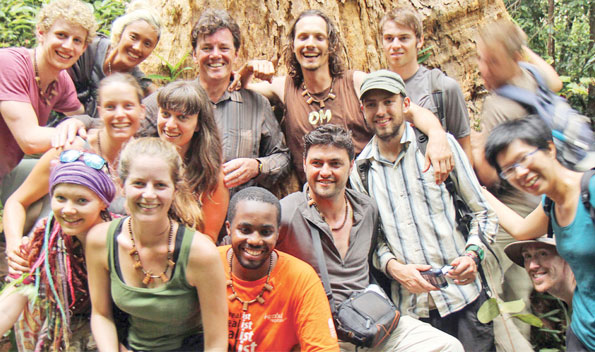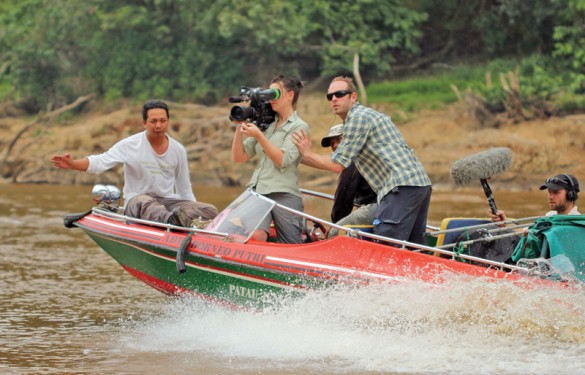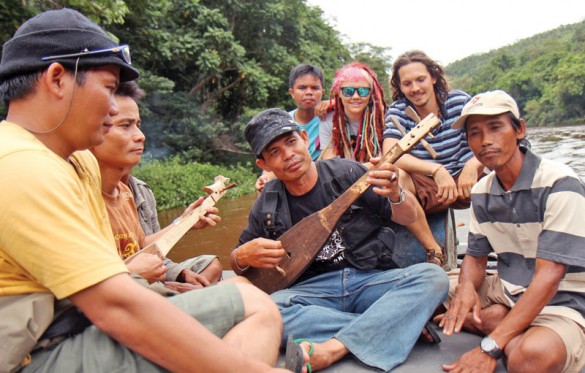In 2010, students bashed their heads together at Microsoft’s Regional Innovative Education Forum and decided that they wanted to tackle the global issue of deforestation and so the project DeforestACTION was born. After project leaders contacted producers at Virgo Productions, the Rise of the Eco-Warriors film was initiated. Eleven young warriors were selected to spend 100 days in the jungles of Borneo – their backgrounds included reforestation, media, mapping and wildlife care. Their mentor was Dr. Willie Smits, a renowned conservationist in Indonesia who launched a satellite monitoring system called Earthwatchers as part of the DeforestACTION project.
I recently met Paul Daley at a community gardening project in Jogjakarta and had the opportunity to find out about his perspectives as eco-warrior in this bold project which has received criticism, but may inspire students worldwide to be more pro-active regarding deforestation and conservation.
How did you handle the 100 days in the forest?
I was raised on a rainforest and fruit tree nursery in Northern NSW, an area home to the largest swathe of World Heritage Listed sub-tropical rainforest in Australia. So I’m very much at home trekking through the forest. Many of the other ‘eco-warriors’ had never explored the rainforest and came from urban environments. It has quite hilarious watching them deal with the insects, wet season mud and rural Indonesian conditions (like the toilets!). I live for this stuff, whilst some of them were terrified!
And which field in the project did you specialize in?
I specialized in forest restoration, as my background in Australia integrates forest restoration with permaculture and agro-forestry. In Borneo the forest restoration team worked with Dayak people in establishing seedling nurseries to increase the capacity for their existing tree planting programs.
I remember you had a good sense of humour – do you have any funny stories about your 100 days in the jungle?
Absolutely! We did a lot of laughing, and the Dayaks have a great sense of humour, I think humour is a natural coping mechanism for keeping your spirits up when confronted with the sights of deforestation.
There was one night when we were far up the Kapuas River in a remote section of West Kalimantan, meeting with Dayak leaders who were telling us the story of land-grabbing by Palm Oil companies (they usually bribe someone in the village and then claim the entire area under a palm oil concession). Anyway, the meeting had gone on for hours and mostly in Indonesian (most of us only spoke very little Bahasa at this stage). All of a sudden a bat flew into the hall, did a few circles and then went ‘BANG’ smack into the wall, fell onto the floor for a moment and then exited the building. For some reason it was just so hilarious. We couldn’t stop laughing! Slapstick comedy courtesy of the local wildlife!
On a more serious note, the eco-warrior from Kenya nearly drowned in a river. He had only ever swam in a lake back in his homeland and the first instant he jumped into a free-flowing stream his body went into shock, he panicked and went under. Myself and Tom Smith from England had to jump in and rescue him. It was such a close call as he weighs over 100 kilograms and the river was flowing quite fast from overnight rain! Scary!
Tell us about the Rise of Eco-Warriors project.
We had major project challenges, funding issues, project partners pulling out mid ‘100 days’, our ‘mentor’, Dr. Willie Smits, was only present for a small fraction of the 100 days and I personally came to the realization that the entire concept of ‘100 days in the jungle’ with a group of mostly inexperienced bule ‘warriors’ who speak barely any Bahasa is a ridiculous concept for sustaining any conservation initiative. To be kind, we were extremely naive, but for me there were countless life lessons learnt and some potent seeds planted that continue to sprout today. As one wise sage from central Asia said thousands of years ago “there is no failure, only lessons.”
Tell us about the project’s mentor, Dr. Willie Smits, and his reforestation program.
Dr. Willie Smits is an incredibly passionate conservationist, I first saw his TED Talks around 2008. He has played a critical role in orangutan and forest conservation throughout Indonesia for over three decades and his approach to forest restoration is definitely ahead of his time (integrating agro-forestry into a closed canopy forest eco-system). Despite moments of feeling let down by Willie, to this day I have the greatest respect for his heartfelt passion and action on behalf of orangutans, Dayak communities and Indonesia’s rich biodiversity.
In reality 100 days was nowhere near long enough to see tangible results for our efforts, especially for forest restoration. We did, however, give an added boost to the efforts of local Dayaks by building a community nursery which became a hub for the distribution of thousands of sugar palm seedlings. This Dayak community in Borneo is incredible; they were the first village in all of Interior Kalimantan to have ‘off-grid’ electricity by building their own ‘micro-hydro’ power generation unit. In the 1990s they resisted efforts by multi-national logging companies to destroy their forests and every single member of the community signed an agreement that they do not want palm oil to destroy their ancestral forests.
You retain a very pro-active approach regarding deforestation – what is your advice to people who want to help in cities like Jakarta?
I think awareness is critical; sustained action only comes after acknowledging what is actually happening. It is so easy to get lost in the pace of modern city life and finding some balance helps us to stay connected. Ultimately, I believe that what is happening to our planet is a reflection of our conditioned separation from the natural world. Earlier this year I collaborated with a grass-roots permaculture collective, who work to bring awareness of nature back into city landscapes through urban agriculture and backyard ‘food gardens’. Whatever you can do to raise awareness, plant some seeds, educate yourself and join together with like-minded people.
Paul Daley is now planting many ideas and seeds across Indonesia and is involved in a reforestation program in Sumatra with the Orangutan Information Centre. Orangutans are often called ‘gardeners of the forest’ because of the way they consume fruit and disperse seeds – and now it seems we need more gardeners than ever.






